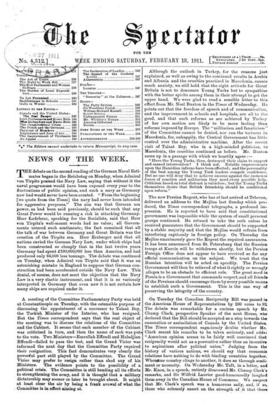A meeting of the Committee Parliamentary Party was held at
Constantinople on Tuesday, with the ostensible purpose of discussing the appointment of a successor to Talaat Bey, the Turkish Minister of the Interior, who has resigned. But the Times correspondent says that the real object of the meeting was to discuss the relations of the Committee and the Cabinet. It seems that each member of the Cabinet was criticised in turn, and then the name of each was put,. to the vote. Two Ministers—Emrullah Effendi and Haladjian Effendi—failed to pass the test, and the Grand Vizier was informed the next day that the Committee Party required their resignation. This fact demonstrates very clearly the powerful part still played by the Committee. The Grand Vizier may prefer to resign rather than shed any of his Ministers. The evidence points to the possibility of a political crisis. The Committee is still bending all its efforts to strengthening the army, and it is thought that a military dictatorship may sooner or later be brought about. It might at least clear the air by being a frank avowal of what the Committee is in effect aiming at.
Although the outlook in Turkey, for the reasons just explained, as well as owing to the continued revolts in Arabia and Albania and the cruelties practised in Macedonia, causes much anxiety, we still hold that the right attitude for Great Britain is not to denounce Young Turks but to sympathise with the better spirits among them in their attempt to get the upper hand. We were glad to read a sensible letter to this effect from Mr. Noel Buxton in the Times of Wednesday. He points out that the freedom of speech and of communication, and the improvement in schools and hospitals, are all to the good, and that such -reforms as are achieved by Turkey of her own motion are likely to be more lasting than reforms imposed by Europe. The "militarism and fanaticism" of the Committee cannot be denied, nor can the tortures in Macedonia, for, unhappily, the Central Government has little control over the administrative machine. After the recent visit of Talaat Bey, who is a, high-minded politician, to Macedonia, the cruelties continued as before. Mr. Buxton sums up in a passage with which we heartily agree :-
"Have the Young Turks, then, destroyed their claim to support and earned intervention? I think not. Notable improvements upon the Hamidian inferno have been effected; and the personality of the best among the Young Turk leaders compels confidence. But no one will deny that to achieve success against the immense forces of reaction and militarism they need every possible help. Criticism based on total distrust is valueless ; but the Young Turks themselves desire that British friendship should be conditional upon reform."






































